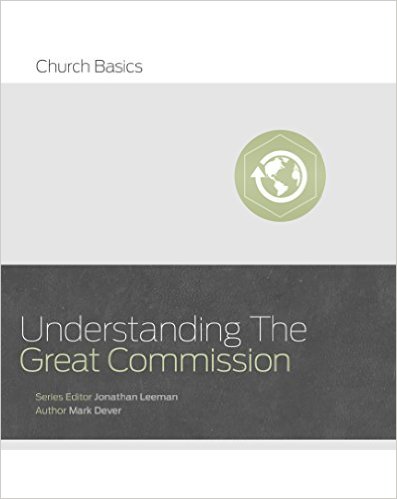The following 20 quotes caught my attention as I read Mark Dever’s new book Understanding the Great Commission, part of B&H’s excellent Church Basics series. Thanks to Tony Reinke for inspiring the 20 quotes idea.
“The Great Commission is normally fulfilled through planting and growing local churches. . . . So the Great Commission involves you, the individual Christian. But the Great Commission also involves you through your local church. That is the normal way God means for us to go, make disciples, baptize, and teach.” (2)
“There is one place we should look for the firstfruits of heaven on earth: the local church. It’s where we catch the first glimpses of heaven’s springtime blossoms.” (11)
“You can have wonderfully rich quiet times, but if that doesn’t translate into how you treat other people, then something is wrong. The normal, natural way for Christians to express our love to God is not merely in singing hymns to him, though that is wonderful. It is also in giving ourselves in love to others.” (13) 
“Churches possess the authority to recognize heaven’s truth and to recognize heaven’s people, just as they should demonstrate heaven’s love.” (16)
“The church is not fundamentally a human idea, or a human creation. Fundamentally, it is God’s idea and God’s work. In one sense, God is the great church planter!” (16)
“The story of the gospel’s spread is the story of the spread of churches. . . . [In the book of Acts], wherever the gospel goes, churches show up. . . . Churches are at the center of God’s Great Commission plan.” (18, 19)
“We don’t want an ‘information’ booth version of the Great Commission. . . . [Many Christians] show up on Sunday, receive a download of information, and then spend the rest of the week better informed, yes, but scarcely connected to the other members of the church or the pastors. That’s how an information booth works. You walk up to the desk, ask your question, and walk away better informed. But you leave with no relational ties to the people back at the desk. They’ve performed their duty, and now you can get on with your business.” (23)
“A sheep that’s converted should not hang out by itself. We live in a fallen, wolfy world. . . . A sheep needs to get himself into a flock where there are shepherds who will guard him. It’s a proud and stupid thing for a sheep to remain by himself, as if there were no wolves.” (25)
“The Great Commission is not about less than personal evangelism and missions, but it is about more. It is about planting churches where people commit to Christ and to one another as members through baptism and the Lord’s Supper.” (31)
“Too often, a grotesque competitiveness between churches marks evangelical churches. But a Great Commission church does not compete with other gospel-preaching churches because it knows every gospel-preaching church is playing for the same team. . . . The members and leaders are as happy about a new gospel-preaching church as they are about a new restaurant opening up in a land of starvation.” (34, 35)
“Discipleship is my following Jesus. Discipling is me helping someone else follow Jesus.” (35)
“A Great Commission church should be uncomfortable for a nominal Christian. If you show up as a guest in such a church on Sunday only as part of your casual duty, you may not like it very much. You would be welcomed, but its members would not be what you are about. They are about giving their whole lives to follow Jesus, and they commit to help one another follow Jesus. Such a commitment and such activity is part of the very culture: intentional questions, meaningful conversations, prayer, and continual reminders of the gospel.” (36)
“A Great Commission church works to train its members in evangelism, because it knows they will collectively see more non-Christians throughout the week than will ever be able to fit in the church building. So ‘success’ in evangelism is not simply bringing your non-Christian friends to church so that they hear the gospel. Success is sharing the gospel with your non-Christian neighbors and friends.” (36) 
“[Our church] prefers supporting few missionaries with more money rather than lots of missionaries with only a little money. That enables the missionaries we do support to spend less time raising money and more time doing the work of church planting. Plus, it helps us to have a relationship with them and offer accountability.” (38)
“Churches commonly have a missions budget line. I think it’s worth adding a ‘Fostering Healthy Churches’ budget line as well. Working to strengthen other churches is a practice of a Great Commission church.” (39)
“You should be careful about criticizing other churches. Yes, there are places where your church’s practices or secondary doctrines might differ from those of other churches. . . . But keep in mind that those secondary matters over which your church might disagree with other churches are never as important as the gospel we all share.” (40–41)
“I commonly tell my church that we just want people to be spiritually fed; they don’t need to eat at our restaurant. There are a number of good places they can go in our city. We simply want the level of spiritual hunger on our planet to be reduced.” (43)
“I am so thankful for what God has done in my own city of Washington over the last two decades. When I arrived just over 20 years ago, there were not many healthy, gospel-preaching churches on Capitol Hill that I would have recommended to someone. Today there are half a dozen just on the Hill that I could recommend, and even more throughout the District of Columbia. We list these ‘sister churches’ on our website and on printed cards that hang by our church building doors. If someone doesn’t like our church, or the drive is too far, hopefully they will try one of these other congregations.” (44)
“We need to stop being so turfy about our churches. . . . Our hope is that a number of other churches in our area see us as a resource for them, one who asks little to nothing from them, but has plenty of love and care to give.” (44, 46)
“Think of how the flight attendants on an airplane tell you to put the mask over your own face before placing it over the face of the person traveling with you. In the same way, it is okay for you to care for your own spiritual health first. You need to be able to breathe and grow spiritually if you want to help others.” (50)
Previously in the “20 Quotes” series:
- Sinclair Ferguson, The Whole Christ (Crossway, 2016)
- Albert Mohler, We Cannot Be Silent (Thomas Nelson, 2015)
- Mark Dever and Jamie Dunlop, The Compelling Community (Crossway, 2015)
- Russell Moore, Onward (B&H, 2015)
- Rosaria Butterfield, Openness Unhindered (Crown & Covenant, 2015)
- Tim Keller, Preaching (Viking, 2015)
- Tim Keller, Prayer (Dutton, 2014)
- Kevin DeYoung, Taking God at His Word (Crossway, 2014)
Is there enough evidence for us to believe the Gospels?
 In an age of faith deconstruction and skepticism about the Bible’s authority, it’s common to hear claims that the Gospels are unreliable propaganda. And if the Gospels are shown to be historically unreliable, the whole foundation of Christianity begins to crumble.
In an age of faith deconstruction and skepticism about the Bible’s authority, it’s common to hear claims that the Gospels are unreliable propaganda. And if the Gospels are shown to be historically unreliable, the whole foundation of Christianity begins to crumble.



































